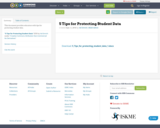
This document provides educators with tips for protecting student data.

This document provides educators with tips for protecting student data.
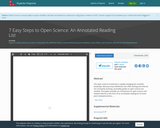
The Open Science movement is rapidly changing the scientific landscape. Because exact definitions are often lacking and reforms are constantly evolving, accessible guides to open science are needed. This paper provides an introduction to open science and related reforms in the form of an annotated reading list of seven peer-reviewed articles, following the format of Etz et al. (2018). Written for researchers and students - particularly in psychological science - it highlights and introduces seven topics: understanding open science; open access; open data, materials, and code; reproducible analyses; preregistration and registered reports; replication research; and teaching open science. For each topic, we provide a detailed summary of one particularly informative and actionable article and suggest several further resources. Supporting a broader understanding of open science issues, this overview should enable researchers to engage with, improve, and implement current open, transparent, reproducible, replicable, and cumulative scientific practices.
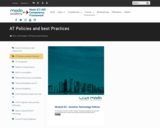
In this module we will provide a comprehensive description of the legal landscape of the assistive technology locally and on an international level as well as best practices.
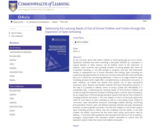
At any one time, about 300 million children of school going age are not in school. Experience indicates that when schooling is disrupted, whether by a pandemic, a natural disaster or other reasons, not all children return to the classroom. In addition, most countries have growing numbers of young people who have not completed schooling, or not well enough to progress, and who find themselves neither in employment nor in further education and training.
Open schooling can create learning opportunities for those not in school, those who left school and those who are in school but not learning effectively. There is no single model for open schooling provision which might offer a complementary or alternative curriculum, or both. However, all models can benefit from greater use of open educational resources; open, distance and flexible methods and open educational practices. In this way it is possible to address issues of access, quality and affordability in a sustainable way.
This book offers guidelines and examples that will be of use to teachers, managers, policy-makers and education leaders interested to ensure that the education system meets the needs of all children and youths.

14.461 is an advanced course in macroeconomics that seeks to bring students to the research frontier. The course is divided into two sections. The first half is taught by Prof. Iván Werning and covers topics such as how to formulate and solve optimal problems. Students will study fiscal and monetary policy, among other issues. The second half, taught by Prof. George-Marios Angeletos, covers recent work on multiple equilibria, global games, and informational fictions.

14.462 is the second semester of the second-year Ph.D. macroeconomics sequence.
The course is intended to introduce the students, not only to particular areas of current research, but also to some very useful analytical tools. It covers a selection of topics that varies from year to year. Recent topics include:
Growth and Fluctuations
Heterogeneity and Incomplete Markets
Optimal Fiscal Policy
Time Inconsistency
Reputation
Coordination Games and Macroeconomic Complementarities
Information
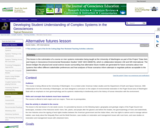
Alternative futures studies are a valuable yet resource-intensive way in which environmental scientists try to conduct informed debates about policies for specific geographic regions. These studies require modeling what the future would look like if different stakeholder groups had their way. The modeling is carried out by applying historical trend data to future projections that are rooted in the preferences of the different groups. Alternative future studies can be controversial due to the limitations of modeling and to the extent to which the models represent fully the different possible scenarios. Yet, they can be especially valuable for decision making about which areas in the region would be most appropriate and most acceptable for the applications of different policies such as development and restoration. Through a series of hands-on classroom activities that are the culmination of a variety of field trips, case studies, and analyses of GIS data about river systems and river restoration options, the students build deep understanding about what alternative futures studies entail and what are the applications of such studies to specific rivers in the Puget Sound area.
(Note: this resource was added to OER Commons as part of a batch upload of over 2,200 records. If you notice an issue with the quality of the metadata, please let us know by using the 'report' button and we will flag it for consideration.)

We will explore the changing political choices and ethical dilemmas of American scientists from the atomic scientists of World War II to biologists in the present wrestling with the questions raised by cloning and other biotechnologies. As well as asking how we would behave if confronted with the same choices, we will try to understand the choices scientists have made by seeing them in their historical and political contexts. Some of the topics covered include: the original development of nuclear weapons and the bombing of Hiroshima and Nagasaki; the effects of the Cold War on American science; the space shuttle disasters; debates on the use of nuclear power, wind power, and biofuels; abuse of human subjects in psychological and other experiments; deliberations on genetically modified food, the human genome project, human cloning, embryonic stem cell research; and the ethics of archaeological science in light of controversies over museum collections.
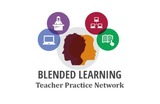
Antibiotics save people’s lives...and make bacteria stronger and more likely to kill us. What is the best practice to balance these conflicting issues? In this problem-based learning module, the students will be evaluating real-life medical situations in conjunction with actual staff at those institutions and offering action plans to be ‘implemented’ there. In order to accomplish this, the science unit will be interlocking with social studies and a language arts unit that will have them identifying target audiences and sculpting a way to present their findings. This unit has the potential to be a full problem-based unit as well as highly interdisciplinary--it’s connected to full units in social studies and language arts which stand alone but can be fully integrated if desired.

This Communication and Argumentation seminar is an intensive writing workshop that focuses on argumentation and communication. Students learn to write and present their ideas in cogent, persuasive arguments and other analytical frameworks. Reading and writing assignments and other exercises stress the connections between clear thinking, critical reading, and effective writing.
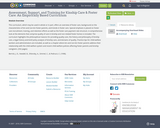
This curriculum, which may be used in whole or in part, offers an overview of foster care, background on the characteristics of kin and non-kin foster parents, and trends in foster care. Special emphasis is placed on foster care recruitment, training, and retention efforts as well as the foster care payment rate structure. A comprehensive look at the elements that comprise quality of care in kinship and non-related foster homes is included. The curriculum highlights the philosophical reasons for providing quality care, the history and philosophy of kinship care, a legal history and brief policy analysis of kinship care, and domains of quality. Practice tips for child welfare workers and administrators are included, as well as a chapter where kin and non-kin foster parents address their relationship with the child welfare system and recent child welfare policies affecting foster parents and kinship caregivers. (332 pages)Berrick, J. D., Needell, B., Shlonsky, A., Simmel, C., & Pedrucci, C. (1998).
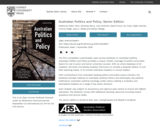
This book is a broad introduction to Australian politics and public policy. This field of study is important for Australians to understand the exercise of political power, their history and the scope for change. It is also important for analysts outside Australia looking for comparative cases. Within this volume are diverse topics and perspectives, demonstrating that the study of Australian politics and policy is not ‘fixed’. Rather, it is a contested field of academic scholarship. Indeed, the volume’s editors do not all agree on the content of this introduction!
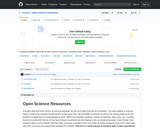
Scientific data and tools should, as much as possible, be free as in beer and free as in freedom. The vast majority of science today is paid for by taxpayer-funded grants; at the same time, the incredible successes of science are strong evidence for the benefit of collaboration in knowledgable pursuits. Within the scientific academy, sharing of expertise, data, tools, etc. is prolific, but only recently with the rise of the Open Access movement has this sharing come to embrace the public. Even though most research data is never shared, both the public and even scientists in their own fields are often unaware of just much data, tools, and other resources are made freely available for analysis! This list is a small attempt at bringing light to data repositories and computational science tools that are often siloed according to each scientific discipline, in the hopes of spurring along both public and professional contributions to science.
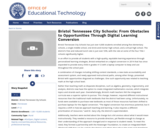
Bristol Tennessee City Schools has just over 4,000 students enrolled among five elementary schools, a single middle school, one brick-and-mortar high school, and a virtual high school. The district’s free and reduced lunch rate is just over 53%, with the rate at some of the four Title I schools significantly higher.
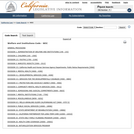
This resource points to the California Welfare and Institutions Code from the California State Legislature.
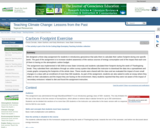
Step 1. Students are asked to keep track of their energy use from a variety of sources (heating/cooling, electricity, transportation, secondary emissions, etc) during the 9 days of Thanksgiving break, when many of them are likely to travel. They use the total for the 9 days that they calculated using an online calculator to estimate their yearly footprint and compare it to US and world averages. For most of them, the amount of carbon emitted during those 9 days is quite large because of airplane travel or long-distance driving. However, using a week of break when many students will travel allows them to become aware of the significance of transportation in carbon emissions. We provided a table with electricity and heating/cooling bills for various residence halls for students who stay on campus during the break.
Step 2. Students complete an online survey where they are asked to enter the values that they have obtained for the various components of the calculator, perform some simple calculations and compare their annual footprint to the U.S. average. We used SurveyGizmo for the survey because it allows to download the data in a spreadsheet format and has some limited plotting features. The free version allows a maximum of 250 submissions, the Basic version ($19 per month, can be canceled at any time) has unlimited submissions.
Step 3. Students write an essay through BlackBoard/WebCT (Assignment). A few guiding questions are provided for this essay where students reflect on the results of their impact on the global carbon budget, what they found surprising, and if they plan to make any changes to their lifestyle to limit their impact. No length limit is set for the essay.
The guidelines and components of this assignment are available on a wiki page. The three steps can be implemented in BlackBoard/WebCT as a Lesson Plan with links to the online calculator (step 1), to the survey (step 2), and to the Assignment/essay (step 3).
(Note: this resource was added to OER Commons as part of a batch upload of over 2,200 records. If you notice an issue with the quality of the metadata, please let us know by using the 'report' button and we will flag it for consideration.)
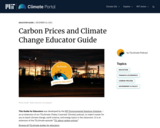
Carbon pricing, including cap-and-trade and carbon taxes, is one tool in the toolbox governments have to reduce the impacts of climate change. What kind of a tool is it? After an introduction to carbon pricing, students use an online simulator to investigate multiple pathways to a cooler future.
This Guide for Educators was developed by the MIT Environmental Solutions Initiative as an extension of our TILclimate (Today I Learned: Climate) podcast, to make it easier for you to teach climate change, earth science, and energy topics in the classroom. It is an extension of the TILclimate episode "TIL about carbon pricing."
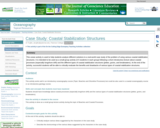
This ocean activity is used to help students analyze different solutions to a real-world case study of the problem of using various coastal stabilization structures. It is intended to be used as a small group activity (3-5 students in each group) following a short introductory lecture about coastal processes (especially longshore drift) and the different types of coastal stabilization structures (jetties, groins, and breakwaters). At the end of the activity, successful students will be able to critically evaluate the benefits and drawbacks of various types of coastal stabilization structures.
(Note: this resource was added to OER Commons as part of a batch upload of over 2,200 records. If you notice an issue with the quality of the metadata, please let us know by using the 'report' button and we will flag it for consideration.)
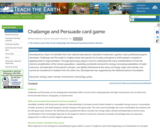
Developed by a team of scientists from two national laboratories, education researchers, gamers, and a professional game developer, Challenge and Persuade is a highly social, fast-paced, fun-to-play card game in which players compete in applying skills in argumentation. Through game play, players come to understand the many manifestations of how the extreme amplification of the human population, exploding worldwide demand for energy, increasing exploitation of water resources, and alteration of the planet's climateâare tightly intertwined at the nexus of energy, water, and climate; one cannot be considered in isolation from the other two. Development was supported by the National Science Foundation.

This lecture course provides students with a comprehensive introduction to the international relations of the People’s Republic of China. China’s foreign relations during the Cold War as well as contemporary diplomatic, security and economic issues will be examined to identify and explain China’s foreign policy goals and their implementation since 1949. Throughout, this course will investigate the sources of conflict and cooperation in China’s behavior, assessing competing explanations for key events and policies. Readings will be drawn from political science, history, and international relations theory.